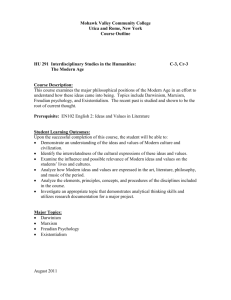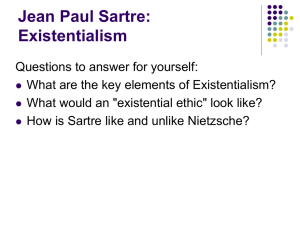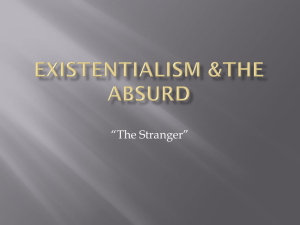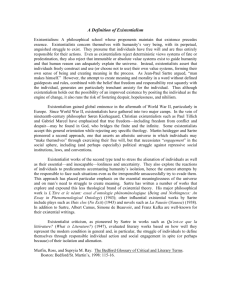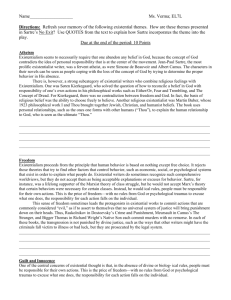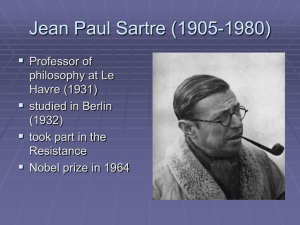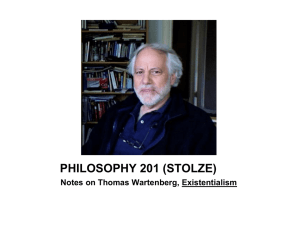Marxism and Existentialism: M.
advertisement
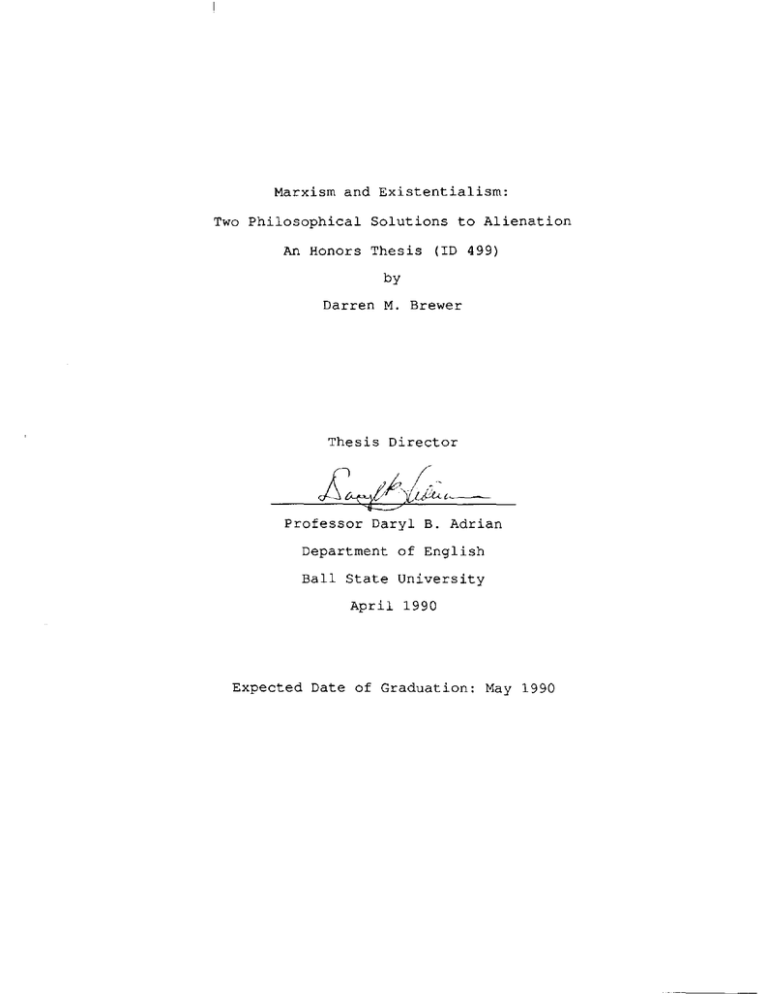
Marxism and Existentialism: Two Philosophical Solutions to Alienation An Honors Thesis (ID 499) by Darren M. Brewer Thesis Director Professor Daryl B. Adrian Department of English Ball State University April 1990 Expected Date of Graduation: May 1990 Sp2ol! l}'C"~1 :: I.-D , ~~€l ,tt.l 1 \Clc/O .B74 "I consider Marxism the one philosophy of our time which we cannot go beyond . . I hold the ideology of existence and its 'comprehensive' method to be an enclave inside Marxism, which simultaneously engenders it and rejects it," Sartre proclaims in the preface of Search !Q£ Q Method, which was published in 1975. In keeping with this premise, my study of existentialism and Marxism has led me to believe they are indeed two philosophies which best enable individuals to cope with living in the twentieth century, which subsequently will be referred to as the "modern situation." Marxism and existentialism are particularly suitable to the modern situation because of the special problems of that situation, specifically alienation and the so-called "death of God." This position does not uphold that Marxism and existentialism are correct in all of their conclusions, only that, given the modern situation and the human predicament as it exists in our time, the philosophies of Marxism and existentialism more than any other approaches directly address the sense of alienation and helplessness that afflict humanitcy. In a critical essay on Existentialism, Gordon E. Bigelow says the growth of science and "an everincreasing rational ordering of men in society" have forced reason to abandon or "dissociate" from the human psyche, which has led to a universal sense of alienation 2 and estrangement. "The main forces of history since the Renaissance have progressively separated man from concrete earthly existence" (Bigelow 172). In a similar way, Marxism has also contributed to this predicament. Marxism is based on the concept of historical materialism. Marx believed that history was an evolution of class struggles and relations in which the factors of production played a leading role. As noted by Stumpf, Marx wrote the following: What I did that was new was to prove that the existence of classes is only bound up with particular historical phases in the development of production; that the class struggle necessarily leads to the dictatorship of the proletariat; that the dictatorship itself only constitutes the transition to the abolition of all the classes and to a classless society. (Marx in Stumpf 426) How does this perspective apply itself to the modern situation? Specifically, Marxism in its analysis and critique of capitalism zeros in on the elements of alienat.ion, the sense that the individual is somehow separate from others, from work, from the products of labor, from him or herself, and from life itself. This is due to the capitalistic tendency to place overriding significance on profit and the resultant class conflict. So powerful was this evolution of relationships to Marx that he saw historical materialism as the only 3 explanation for it. History, he believed, was a materialistic and deterministic force that propelled human society into greater and greater alienation and conflict, which at some point would inevitably explode in violent revolution between the proletariat and the bourgeoisie. At each point in the evolution of historical materialism, alienation would increase to such an extent that only violent revolution would cure it, leading to an ultimate workers' paradise in which no classes would any longer exist. Alienation would be cured because human relationships would replace earlier economic relationships. As Sowell writes: Money originally had value only because it represented the real goods it could buy, but eventually goods appear to have value only because they can be sold for money. It is this "inversion of the original relationship" that is central to the concept of alienation. . Marx said, "It is no longer the laborer that employs the means of production, but the means of production that employ the laborer" (26-27) Thus we see that Marxism is useful to the modern individual in this modern situation because it explains ~ that. alienation has come about and how it may be cured. 4 Marxism has yet to demonstrate that it indeed has the cure it promises, but it has been effective in analyzing the capitalistic tendencies that create alienation in the first place, and that success has been the major foundation of its popularity among working people in nations who seek to overthrow the processes of capitalism, as evidenced in the USSR for more than half a century and in Cuba for more than two decades. Existentialism essentially addresses itself to the same problem of alienation, as observed earlier by Bigelow. But instead of approaching the problem from the perspective of economics, the existentialists such Sartre deal with it from a more fundamental point of view--that of existence itself. For instance, the situation of humanity as seen by Sartre is Rabsurd and tragic." As documented by Kaufmann, Marx said he believe~l that Rexistentialism must be lived to be really sincere. To live as an existentialist means to be ready to pay for this view and not merely to lay down its books" (Marx in Kaufmann 47). Au~henticity approach. is a major element of the existential Like the Marxists, the existentialists accept the premise that God or religion no longer plays an important role in human society, no longer addresses the basic problems of existence in a world that allows individuals to begin to transcend the meaninglessness or alienation which pervades the modern situation. 5 Stumpf raises the issue that according to the concept of authenticity, "an individual . . is aware, notwithstanding his variety of sense experiences, that his life consists, or ought to consist, or more than his emotive and sense experiences" (459). In fact, the existentialists believe that the act of will of authenticity is required to transcend alienation. As seen in the writings of Richter, "This consciousness of alienation, the consciousness of being an outcast and . dehumanized is not just an histrionic pose with Sartre or an abstruse problem f~r intellectuals" (4) Indeed, in both Marxism and existentialism, alienation is both the essential affliction of modern humanity as well as a kind of inspiration for change. To the existentialist, this change can only authentically take place in the will of the individual, while in Marxism this change must be economic, social, and political. For the Marxist, the change of the individual is meaningless because that philosophy focuses on society as a whole. To the existentialist, on the other hand, this change on the social or economic or political level is not central because it is no guarantee that it will reduce the alienation of the individual's existence on a more fundamental level. There are clear parallels between the two philosophies, however, which leave much room for compromise and reconciliation. For example, "Sartre 6 spoke of all men as bastards and traitors" (Sartre in Richter 3) He further contends that people are bastards: We all lead double lives--one life legitimate, the other illegitimate--a collective community of oppressed and humiliated beings who forever justify their own existence. Traitors, because we never make an absolutely free decision, but are all slaves of the human condition which casts us into a concrete situation, because everything we are and do is determined by bad faith, which poisons every second of our lives. Accordi~g (Sartre in Richter 3) to Richter, Sartre similarly believes that people must live in a state of "perpetual alienation" either ~o their own culture or that of another, and that the role of the proletariat in a Marxist class struggle is a fitting analogy (4). Thus we see that there are indeed means to a reconciliation between Marxism and existentialism, based on the concept of alienation central to both philosophies. The Marxists simply must come to understand that the coming of the workers' utopia could benefit from the individuals in society exercising their wills through authenticity to move them out of alienation in preparation for a strengthening, which would bring about the revolution that would lead to that paradise. From the existentialists viewpoint, 7 Marxism could help them understand that the individual could more effectively lead an authentic life if the alienation of society was eliminated through the coming of the justices inherent within that paradise. Kaufmann says "it is mainly through the work of Jean-Paul Sartre that existentialism has come to the attention of a wide international audience" (40). Two basic existentialist concepts of Sartre are pour-soi and en-soi. The first refers to "conscious beings. or beings for-themselves, beings part of whose nature is that they are aware of themselves and cannot exist without such awareness" (Danto 41-42) . Clearly, this concept could benefit Marxism because such aware individuals could more willingly and effectively participate in the revolution and the establishment of the proletariat dictatorship and the subseq~ent workers' utopia. The concept of en-soi has to do with "beings that exist in themselves and are objects for an alien consciousness, having no consciousness of their own. Nothing can be pour-et-en-soi [that is both pour-soi and en-soil (though this would be just the structure of God, and will also be the impossible sort of being to which the pour-soi unremittingly aspires)" (Danto 42). Again, this concept is useful to both the existentialist and the Marxist because it parallels the sense of alienation that pervades the modern world. 8 The essential difference between Marxism and existentialism, again, have to do with the focus of those philosophies. Marxism has a broader social focus while existentialism has its focus on the individual and the moral situation of humanity. The period after the second world war was an important time for existentialism, says Kaufmann, because the attitudes and perceptions of the nation were less than positive. Events led people to examine themselves, their roles in the world, and look for a ways to put it all back together again. As Bree writes, "After 1945, many of Sartre's formulations were almost literal translation of Marx." This is due to the fact that as he matured, Sartre tended to lean more toward a broader application of existentialist ideas and principles, coming to believe that he, as a leader of the philosophical movement, could not isolate himself from the troubles of the political and social worlds. Still, "What Sartre did not have was Marx's insight into the functioning of political and economic institutions or Engels' experience and powers of observation. He remained, essentially, a moralist" (Bree 174-75) Despite the differences, there are clearly common points between the two philosophies. While each is independent, they both operate on a functional level and have contributed significantly to the ways in which we approach life in the twentieth century. Works Cited Bigelow, Gordon E. "A Primer of Existentialism." College Engljsh (23) December, 1961. pp. 171-78. Bree, Germaine. ~ and Sartre. Danto, Arthur . .Jean Paul Sartre. Kaufmann, Walter arnold. New York: Delta, 1972. New York: Viking, 1975. Existentialism fLQm Dostoeysky ~ Sartre. American Library, 1975. Richter, Liselotte. ,lean-Paul Sart re. Sowell, Thomas. Marxjsm. Stumpf, Samuel. Socrates New York: Ungar, 197 a . New York: Morrow, 1985. tQ Sartre. New York: McGraw, 1966. New Appendix: Suggested Readings Barker, George. "An Introduction to Philosophy." Bigelow, Gordon E. "A Primer of Existentialism." Unpublished essay, 1984. College Eng] j sh (23) December 1961. pp. 171-78. camua and Bree, Germaine. Danto, Arthur. Howe, Irving. Sartre. Jean Paul Sartre. Classics ~ New York: Delta, 1972. New York: Viking, 1975. Modern Fiction. 4th ed. San Diego: Harcourt, 1986. Holman, C. Hugh and William Harmon. A Handbook La Literature. New York: Macmillan, 1986. Existentialism fLQm Dostoevsky Kaufmann, Walter Arnold. tQ Sartre. New York: New Amexican Library, 1975. a.Kauf~nn: Existentialism from Dostoevsky to Sartre b.Dosto€:Ysky's ~ fiQm UndergrQuod. H.i.a C . Kierke:gaard' s On Mi SSiOD; On fill fulL.k.ai On H.i..s.. Mo..de. .o..f. Ex] stence; .I.h.a.t.. Indiyidual; .J:U..e..a.d .a.n.d. Freedom; Authority; .IL..u..t.h I I Subjectivity. d.Kafka's e.Sartre's An Imperial Message; Before the LaK. ~ f.Camus' The Reilly, Kevin. lia.ll; Marxism .and Existentialism. ~ The Qf Sisyphus; The Stranger. ~ and ~ World' A Topical History QL Civilization. New York: Harper, 1980. Richter, Liselotte. ,Jean Palll Sartre. Sowell, Thomas. Marxism. Stumpf, Samuel. Socrates New York: Ungar, 1970. New York: Morrow, 1985. ~ Wilkie, Brian and James Hurt. Sartre. New York: McGraw, 1966. Literature.o.f.!..he. Western No..tid. vol. 2. New York: Macmillan, 1984.

